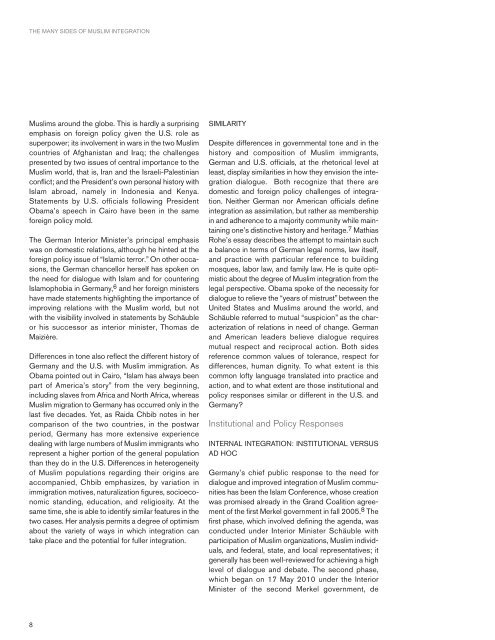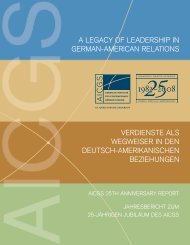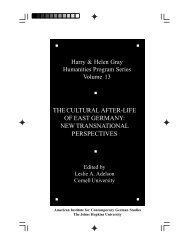the many sides of muslim integration: a german- american - aicgs
the many sides of muslim integration: a german- american - aicgs
the many sides of muslim integration: a german- american - aicgs
You also want an ePaper? Increase the reach of your titles
YUMPU automatically turns print PDFs into web optimized ePapers that Google loves.
<strong>the</strong> <strong>many</strong> <strong>sides</strong> <strong>of</strong> <strong>muslim</strong> <strong>integration</strong><br />
Muslims around <strong>the</strong> globe. This is hardly a surprising<br />
emphasis on foreign policy given <strong>the</strong> U.S. role as<br />
superpower; its involvement in wars in <strong>the</strong> two Muslim<br />
countries <strong>of</strong> Afghanistan and Iraq; <strong>the</strong> challenges<br />
presented by two issues <strong>of</strong> central importance to <strong>the</strong><br />
Muslim world, that is, Iran and <strong>the</strong> Israeli-Palestinian<br />
conflict; and <strong>the</strong> President’s own personal history with<br />
Islam abroad, namely in Indonesia and Kenya.<br />
Statements by U.S. <strong>of</strong>ficials following President<br />
Obama’s speech in Cairo have been in <strong>the</strong> same<br />
foreign policy mold.<br />
The German Interior Minister’s principal emphasis<br />
was on domestic relations, although he hinted at <strong>the</strong><br />
foreign policy issue <strong>of</strong> “Islamic terror.” On o<strong>the</strong>r occasions,<br />
<strong>the</strong> German chancellor herself has spoken on<br />
<strong>the</strong> need for dialogue with Islam and for countering<br />
Islamophobia in Ger<strong>many</strong>, 6 and her foreign ministers<br />
have made statements highlighting <strong>the</strong> importance <strong>of</strong><br />
improving relations with <strong>the</strong> Muslim world, but not<br />
with <strong>the</strong> visibility involved in statements by Schäuble<br />
or his successor as interior minister, Thomas de<br />
Maizière.<br />
Differences in tone also reflect <strong>the</strong> different history <strong>of</strong><br />
Ger<strong>many</strong> and <strong>the</strong> U.S. with Muslim immigration. As<br />
Obama pointed out in Cairo, “Islam has always been<br />
part <strong>of</strong> America’s story” from <strong>the</strong> very beginning,<br />
including slaves from Africa and North Africa, whereas<br />
Muslim migration to Ger<strong>many</strong> has occurred only in <strong>the</strong><br />
last five decades. Yet, as Raida Chbib notes in her<br />
comparison <strong>of</strong> <strong>the</strong> two countries, in <strong>the</strong> postwar<br />
period, Ger<strong>many</strong> has more extensive experience<br />
dealing with large numbers <strong>of</strong> Muslim immigrants who<br />
represent a higher portion <strong>of</strong> <strong>the</strong> general population<br />
than <strong>the</strong>y do in <strong>the</strong> U.S. Differences in heterogeneity<br />
<strong>of</strong> Muslim populations regarding <strong>the</strong>ir origins are<br />
accompanied, Chbib emphasizes, by variation in<br />
immigration motives, naturalization figures, socioeconomic<br />
standing, education, and religiosity. At <strong>the</strong><br />
same time, she is able to identify similar features in <strong>the</strong><br />
two cases. Her analysis permits a degree <strong>of</strong> optimism<br />
about <strong>the</strong> variety <strong>of</strong> ways in which <strong>integration</strong> can<br />
take place and <strong>the</strong> potential for fuller <strong>integration</strong>.<br />
8<br />
SIMILARITY<br />
Despite differences in governmental tone and in <strong>the</strong><br />
history and composition <strong>of</strong> Muslim immigrants,<br />
German and U.S. <strong>of</strong>ficials, at <strong>the</strong> rhetorical level at<br />
least, display similarities in how <strong>the</strong>y envision <strong>the</strong> <strong>integration</strong><br />
dialogue. Both recognize that <strong>the</strong>re are<br />
domestic and foreign policy challenges <strong>of</strong> <strong>integration</strong>.<br />
Nei<strong>the</strong>r German nor American <strong>of</strong>ficials define<br />
<strong>integration</strong> as assimilation, but ra<strong>the</strong>r as membership<br />
in and adherence to a majority community while maintaining<br />
one’s distinctive history and heritage. 7 Mathias<br />
Rohe’s essay describes <strong>the</strong> attempt to maintain such<br />
a balance in terms <strong>of</strong> German legal norms, law itself,<br />
and practice with particular reference to building<br />
mosques, labor law, and family law. He is quite optimistic<br />
about <strong>the</strong> degree <strong>of</strong> Muslim <strong>integration</strong> from <strong>the</strong><br />
legal perspective. Obama spoke <strong>of</strong> <strong>the</strong> necessity for<br />
dialogue to relieve <strong>the</strong> “years <strong>of</strong> mistrust” between <strong>the</strong><br />
United States and Muslims around <strong>the</strong> world, and<br />
Schäuble referred to mutual “suspicion” as <strong>the</strong> characterization<br />
<strong>of</strong> relations in need <strong>of</strong> change. German<br />
and American leaders believe dialogue requires<br />
mutual respect and reciprocal action. Both <strong>sides</strong><br />
reference common values <strong>of</strong> tolerance, respect for<br />
differences, human dignity. To what extent is this<br />
common l<strong>of</strong>ty language translated into practice and<br />
action, and to what extent are those institutional and<br />
policy responses similar or different in <strong>the</strong> U.S. and<br />
Ger<strong>many</strong>?<br />
Institutional and Policy Responses<br />
INTERNAL INTEGRATION: INSTITUTIONAL VERSUS<br />
AD HOC<br />
Ger<strong>many</strong>’s chief public response to <strong>the</strong> need for<br />
dialogue and improved <strong>integration</strong> <strong>of</strong> Muslim communities<br />
has been <strong>the</strong> Islam Conference, whose creation<br />
was promised already in <strong>the</strong> Grand Coalition agreement<br />
<strong>of</strong> <strong>the</strong> first Merkel government in fall 2005. 8 The<br />
first phase, which involved defining <strong>the</strong> agenda, was<br />
conducted under Interior Minister Schäuble with<br />
participation <strong>of</strong> Muslim organizations, Muslim individuals,<br />
and federal, state, and local representatives; it<br />
generally has been well-reviewed for achieving a high<br />
level <strong>of</strong> dialogue and debate. The second phase,<br />
which began on 17 May 2010 under <strong>the</strong> Interior<br />
Minister <strong>of</strong> <strong>the</strong> second Merkel government, de





